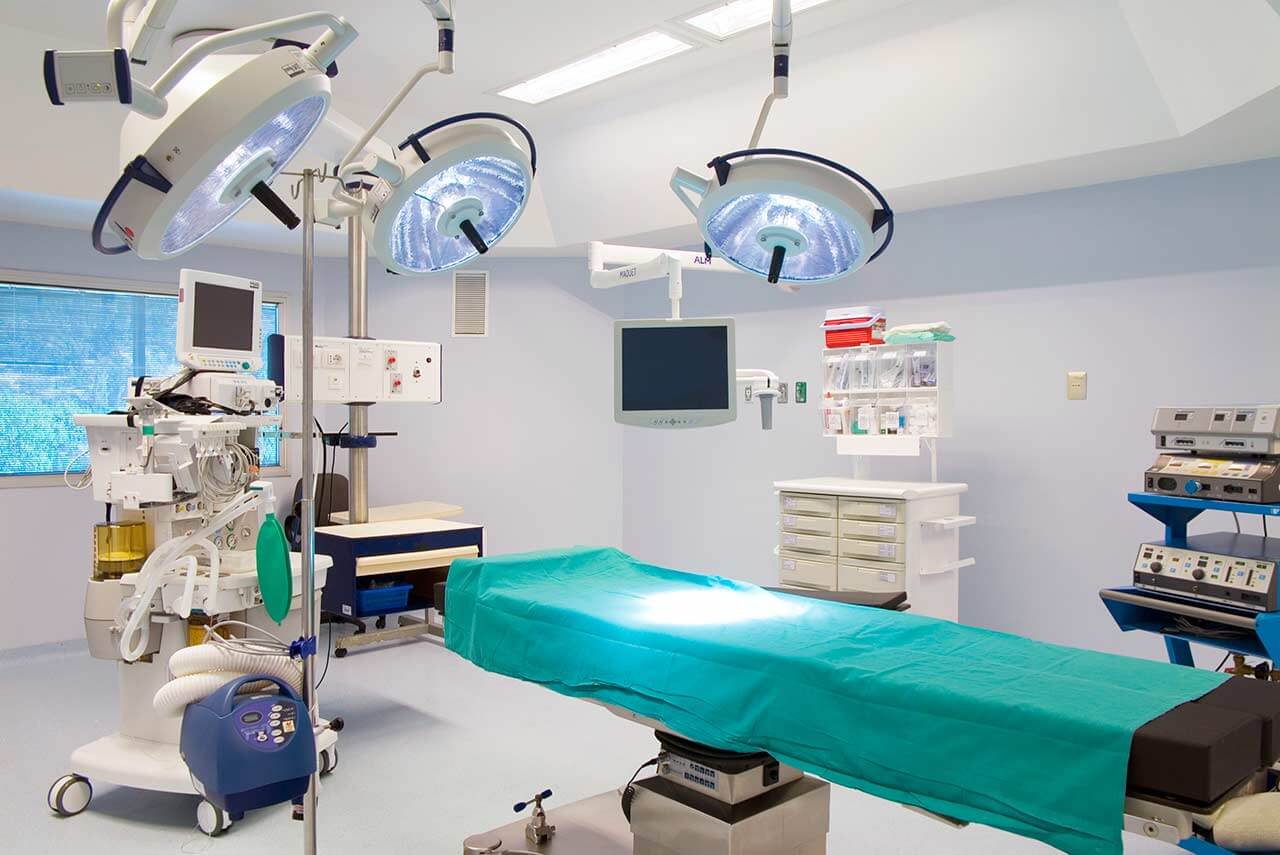
The program includes:
- Initial presentation in the clinic
- clinical history taking
- physical examination
- review of medical records
- laboratory tests:
- complete blood count
- general urine analysis
- biochemical analysis of blood
- indicators of inflammation (CRP, ESR)
- indicators blood coagulation
- abdominal ultrasound
- gastroscopy with biopsy
- analysis of hp (helicobacter pylori)
- preoperative care
- surgical or endoscopic treatment
- symptomatic treatment
- control examinations
- the cost of essential medicines and materials
- nursing services
- nutrition recommendations
- full hospital accommodation
- explanation of future recommendations
Required documents
- Medical records
- Fibrogastroduodenoscopy (FGDS) (if available)
Service
You may also book:
 BookingHealth Price from:
BookingHealth Price from:
About the department
The Department of General and Abdominal Surgery, Hernia Surgery, Bariatric Surgery and Colorectal Surgery at the MIC Hospital Berlin provides the full range of services in the areas of its specialization. The key focus of the department's clinical practice is performing surgical procedures for gastroesophageal reflux disease (GERD). The department performs a large number of interventions to implant the LINX Reflux Management System in patients with GERD. It is this modern operation that is the most effective and least traumatic method of treating the pathology. The department also successfully performs operations to treat diseases of the gallbladder, thyroid gland, rectum, anus, and abdominal adhesions. The surgical options of the medical facility are complemented by hernia repair and morbid obesity treatment. All interventions are performed using minimally invasive techniques in specially equipped, high-tech operating rooms. The department was one of the first highly specialized medical facilities to start practicing minimally invasive surgery, and today it boasts 25 years of experience in this field. The department's specialists perform more than 7,000 operations every year, achieving excellent treatment outcomes. At the same time, patients are guaranteed the highest safety of surgical treatment.
The department is headed by Dr. med. Gerold Koplin. The surgeon is board certified in general and abdominal surgery. The doctor's special clinical focus is the treatment of gastroesophageal reflux disease, including LINX Reflux Management System implantation. This innovative treatment is only available in Germany's most advanced medical facilities. Dr. med. Koplin is known as one of the best experts in the field of GERD surgery in Germany and is also successful in other general and abdominal surgical procedures.
Gastroesophageal reflux disease is caused by sphincter dysfunction, due to which the contents of the stomach are thrown into the esophagus. The disease causes mucosal damage and unpleasant symptoms, including heartburn, belching, burning behind the sternum, and a persistent cough. In many cases, patients manage to control GERD with non-drug methods (nutrition adjustments, refusal of bad habits, and other measures) and drug therapy (antacids and proton pump inhibitors). However, drug therapy is often temporary and may also cause severe side effects.
You can get rid of your gastroesophageal reflux disease once and for all with the help of a surgical intervention, which is indicated for patients with a severe course of the pathology and in the absence of an improvement in the patient's condition after drug therapy. Surgery eliminates the very cause of GERD, that is, sphincter dysfunction. The department offers the following two methods of surgical treatment of gastroesophageal reflux disease: minimally invasive fundoplication and LINX Reflux Management System implantation. With appropriate clinical indications, the specialists prefer the last option of the operation. The LINX Reflux Management System is a small ring made of metal balls with a magnetic core. The anti-reflux device allows the doctors to normalize the esophageal sphincter due to the attractive force between the metal balls, which ensures the closure of the sphincter and prevents reflux. The operation is performed using minimally invasive techniques under general anesthesia. The very next day after the operation, a patient will be discharged and can return to their usual way of life. The LINX Reflux Management System implantation has high success rates and practically does not pose any risks to the patient's health.
The department's team of surgeons regularly admits patients with various types of hernias, including inguinal, umbilical, femoral, incisional, diaphragmatic, and anterior abdominal wall hernias. Any hernia is a pathological protrusion of certain organs from the cavity occupied by them in the normal state through a hole in the tissues. There is only one effective treatment method to eliminate a hernia, and this is surgery. All types of hernioplasty available in the department are performed using minimally invasive techniques through one or two small incisions. The essence of any hernioplasty is to eliminate a hernia defect and strengthen this area with the patient's own tissues or special synthetic meshes.
An important focus of the department's work is bariatric surgery. Bariatric interventions are usually indicated for morbidly obese patients (with a body mass index of 40 or more) who cannot lose weight with standard methods such as diet, exercise, and drug therapy. The department's surgeons specialize in performing gastric bypass, gastric banding, sleeve gastroplasty, and biliopancreatic bypass. During a gastric bypass, the organ is divided into two parts (small and large). Food enters a small part of the stomach, and from there it goes immediately into the intestines. Due to this, a person consumes less food and, at the same time, feels full quickly. The essence of gastric bandaging is the imposition of a special bandage, which also divides the stomach into two parts. When performing a sleeve gastroplasty, the department's surgeons remove part of the stomach, as a result of which patients can no longer eat large portions and lose weight. Biliopancreatic shunting involves not only a reduction in the volume of the stomach but also small intestine reconstruction. This operation is the most complex of all those available. The department's surgeons perform all of the above-mentioned interventions using minimally invasive techniques, so patients recover quickly and do not experience any severe pain in the postoperative period.
In the field of colorectal surgery, the department's doctors treat rectal and anal diseases. The specialists most often deal with benign and malignant neoplasms of the colon and rectum, inflammatory processes in the colon and rectum, rectal prolapse and pelvic organ prolapse, rectocele, hemorrhoids, anal fistulas, constipation, and fecal incontinence. Colorectal surgeons conduct diagnostics, and if the results require the patient to have surgery, they begin planning the upcoming surgical treatment. The department's specialists have exceptional skills in laparoscopic interventions. After such operations, patients can move independently within a few hours after the intervention and practically do not experience any pain, which is impossible after classical open surgery. In addition, the risks of minimally invasive interventions are negligible. Due to its small incisions, laparoscopic surgery also provides a good aesthetic result.
The department's main clinical focuses include:
- General and abdominal surgery
- Laparoscopic surgery for gastroesophageal reflux disease
- Fundoplication
- LINX Reflux Management System implantation
- Laparoscopic surgery for gallbladder diseases
- Endoscopic surgery for thyroid diseases
- Laparoscopic surgery for abdominal adhesions
- Laparoscopic surgery for gastroesophageal reflux disease
- Hernia surgery
- Laparoscopic surgery for inguinal hernias
- Laparoscopic surgery for umbilical hernias
- Endoscopic surgery for femoral hernias
- Laparoscopic surgery for incisional hernias
- Laparoscopic surgery for diaphragmatic hernias
- Laparoscopic surgery for anterior abdominal wall hernias
- Bariatric surgery
- Laparoscopic gastric bypass surgery
- Laparoscopic gastric banding
- Laparoscopic sleeve gastroplasty
- Laparoscopic biliopancreatic shunting
- Colorectal surgery
- Endoscopic surgery for benign and malignant colon and rectal tumors
- Endoscopic surgery for inflammatory processes in the colon and rectum
- Endoscopic surgery for rectal prolapse
- Endoscopic surgery for pelvic organ prolapse
- Endoscopic surgery for rectocele
- Endoscopic surgery for hemorrhoids
- Endoscopic surgery for anal fistulas
- Endoscopic surgery for constipation
- Endoscopic surgery for fecal incontinence
- Other surgical options
Curriculum vitae
Higher Education and Professional Training
- 1998 - 2005 Human Medicine studies at the Medical University of Berlin (Charite).
- 2006 - 2013 Board certification in General Surgery, Charite University Hospital Berlin.
- 2013 - 2016 Board certification in Abdominal Surgery, Charite University Hospital Berlin.
Medical Practice
- July 2006 - February 2016 Surgeon, Department of General, Abdominal, Vascular and Thoracic Surgery, Charite University Hospital Berlin.
- Since March 2016 Surgeon, Department of General and Abdominal Surgery, Hernia Surgery, Bariatric Surgery and Colorectal Surgery at the MIC Hospital Berlin.
Memberships in Professional Societies
- German Society of Surgery (DGCH).
- German Society for General and Visceral Surgery (DGAV).
- International Federation for the Surgery of Obesity and Metabolic Disorders (IFSO).
- Surgical Working Group on Obesity Treatment and Metabolic Surgery (CAADIP).
- Surgical Working Group of Endocrine Surgery (CAEK).
Photo of the doctor: (c) Klinik für MIC
About hospital
The MIC Hospital Berlin positions itself as one of the best, highly specialized medical complexes for minimally invasive surgery. In recent years, this surgical technique has increasingly replaced classical open surgery because it gives patients a chance to undergo low-traumatic surgical treatment and recover from surgery as quickly as possible. The hospital began its work in 1993 and became the first specialized medical facility of this kind in Germany. As of today, doctors have more than 25 years of successful experience performing minimally invasive interventions for abdominal diseases, pathologies of the rectum, anus, and colon, morbid obesity, and certain diseases of the female and male reproductive systems. It is worth noting that the hospital is known for its unique experience in minimally invasive treatment of gastroesophageal reflux disease (GERD). A large number of innovative LINX Reflux Management System implantation operations are regularly performed here. They demonstrate excellent results in the fight against pathology.
In 2000, the hospital launched the world's first fully equipped OR1™ operating room with centralized control and monitoring systems for minimally invasive interventions. As of November 1999, the hospital performed about 1,400 minimally invasive interventions annually, and now this figure has increased to more than 7,000 operations per year. At the same time, according to the results of a nationwide patient survey, the hospital received the highest ratings for patient satisfaction with medical care and the safety of operations. Since then, the medical facility has occupied a leading position in the area of its specialization at the European level.
Patients are treated by top-class surgeons who have long experience in minimally invasive operations of any complexity. The specialists attach particular importance to individualized medical care focused on meeting all the patient's needs and wishes. In addition, treatment in the hospital takes place in a pleasant and cozy environment. The modern design of the patient rooms and corridors in white and blue tones, combined with various modern art paintings, adds a special charm to the hospital.
Photo: (с) depositphotos
Accommodation in hospital
Patients rooms
The patients of the MIC Hospital Berlin live in comfortable single and double rooms. The patient rooms are made in white and blue tones and equipped with modern furniture. The patient rooms are equipped with air conditioning systems. Each patient room has an ensuite bathroom with a shower and a toilet. The patient room furnishing includes an automatically adjustable bed, a bedside table, a table and chairs for receiving visitors, a large flat-screen TV, a radio, and a safe. There is also Wi-Fi access in the patient rooms.
Meals and Menus
The patients of the hospital are offered tasty and healthy meals three times a day. Breakfast and dinner are served as buffets, and for lunch there is a set menu to choose from. The hospital also has a special area where patients and their visitors can taste delicious desserts and drink hot or cold drinks.
Further details
Standard rooms include:
Accompanying person
Your accompanying person may stay with you in your patient room or at the hotel of your choice during the inpatient program.
Hotel
You may stay at the hotel of your choice during the outpatient program. Our managers will support you for selecting the best option.




